Our Top Pre-Travel Tire Maintenance Tips
July 25th, 2019
Road trips can be a lot of fun when they are properly planned. They are a great way to bond with your family and explore new places. We know that for most people, traveling safely and comfortably is of the highest priority. For your next road trip, don’t forget about one of the foremost safety concerns for your vehicle: its tires. The tires support the vehicle load, ensure responsive braking and maintain the direction of travel. To guarantee your vehicle’s tires are functioning adequately, they should be inspected by an experienced professional on a regular basis. 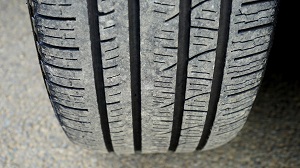

For optimum tire performance, tires must have accurate and proper:
Air pressure
tread depth
...[more]
Tags:
Tire Maintenance
Posted in:
Tires 101
Why is My Auto AC Blowing Hot Air?
July 11th, 2019
Picture this. It’s a typical hot summer day. You just got done winning an intense kickball game. You are hot and exhausted. All you want to do is cool down and head home to have a relaxing evening. When you get to your car, you blast the AC. You wait and wait, but it never gets cold. It’s actually blowing hot air! How could this be? Well, it could be a couple of different factors. The three most common issues it could be are a refrigerant leak, a worn-out compressor or problems  with the electrical system.
with the electrical system.
 with the electrical system.
with the electrical system.
If you are experiencing a refrigerant leak, this is because your AC system is no longer sealed properly, and the refrigerant in your car is now evaporating into gas. This happens because it is no longer under the pressure of a closed-looped AC system. If your pressu ...[more]
Tags:
AC Service
Posted in:
Auto Repair 101
Why Are My Headlights Foggy?
June 27th, 2019
Have you noticed your vehicle’s headlights have grown foggier over time, even though you’ve kept up with car washes and other general maintenance? Are you having difficulty seeing the road in front of you at night or are worried about your visibility to other drivers? Foggy or yellowed headlights are a fact of life for many drivers, but they don’t have to be for you and your vehicle. Read on to learn what you need to know about headlights and the headlight restoration process from our experienced auto technicians.

What Are Headlights Made Of?
Headlights were originally made with glass, but this fragile material made them prone to cracking and shattering. Over the years, auto manufacturers have moved to making headlig ...[more]
Tags:
headlight restoration
Posted in:
Auto Repair 101
Which Tire is Right for You?
June 13th, 2019
With so many different types of tires to choose from, finding the right tire to meet your needs can be overwhelming. The choice ultimately comes down to the type of vehicle you drive and what you’ll be doing after you get that new set of tires. You want to pick a reliable tire which meets your needs and is compatible with your vehicle. Tire types such as snow tires and mud tires serve a specific purpose, while all-terrain and all-season tires are fine for most conditions. Read below for a more detailed description of each tire and their optimal uses.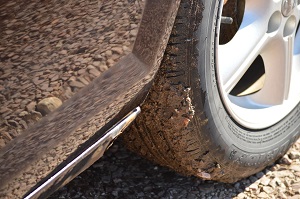

All-Season Tires – All-season tires are the everyman’s tire. They offer good traction in the rain and in normal conditions all year long and offer a quiet and smooth ride. All-season tires also hold up again excess ...[more]
Tags:
Tire Types
Posted in:
Tires 101
Summer Road Trip Tips
May 30th, 2019
The days are getting longer, school is out, and summer is almost here! The rising temperatures have a lot of people itching to hop into their car and head to a body of water or hiking trail. Summer vacations are a time to unplug, relax and have fun with your family and friends. They do, however, require a bit of preparation beforehand. If you are foregoing the airport in favor of a road trip, it’s important to give your vehicle a little TLC before hitting the road to ensure a safe, smooth trip. Nothing can put a damper on a summer road trip quite like vehicle trouble. Before heading out, it’s a good rule of thumb to do a quick check – and service if necessary – of some items on your vehicle. 

Your tires are the only part of your vehicle that come in direct contact with ...[more]
Tags:
auto repair
Posted in:
Auto Repair 101
Maximizing Your Tire Life
May 16th, 2019
If you’re like most people, the thought of opening your wallet to shell out money for tires isn’t at the top of your “things to get excited about” list. Unfortunately, this is a necessary part of owning a vehicle. How often you must replace your tires depends on your driving habits, how well you maintain your tires and the type of tires you purchase. Taking steps to maintain your tires will extend their life significantly, saving you time and money down the road!
One step to maintaining your tires is regular tire rotations. A tire rotation is the simple act of moving
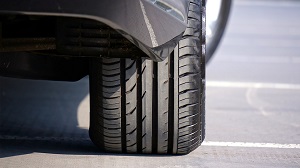
your tires from one position to another to ensure they wear evenly. You may be wondering how moving your tires around can increase your tire’s life. W ...[more]
Tags:
tires
Posted in:
Tires 101
Should I Repair or Replace My Tire?
April 25th, 2019
It’s early in the morning, and you are walking out the door to head to work. As you walk up to your car, you notice your tire is flat. “I just bought these tires two months ago,” you think. Unfortunately, no matter how new your tires are, they are always susceptible to being damaged by nails or other debris in the road. Can it be replaced, or will you have to buy a new tire? 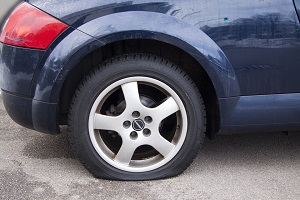

The ability to repair the damaged tire instead of replacing it will depend on how large the puncture is, where the puncture is located and how quickly you spotted the damage. Sure, repairing the tire is the most cost-effective option but not at the expense of you and your passengers’ safety. Before deciding to repair your tire versus buying a new one, you’ll want to ensure your tire is a good candidate for a r ...[more]
Tags:
Tire Maintenance
Posted in:
Tires 101
How Do My Brakes Work?
April 11th, 2019
It’s a sunny day and you’re driving down the road with your windows down and music turned up. All of a sudden, the car in front of you stops abruptly, causing you to slam on your brakes. Thank goodness your brakes worked perfectly, and you avoided a collision. Until this incident occurred you probably haven’t given your brake system much thought. Sure, you know your brakes should be inspected and serviced every once in a while… but how do they actually make your car stop with just a tap of the foot? 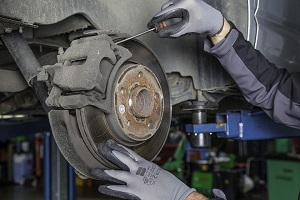

When you really stop and think, you realize brakes are a pretty amazing invention. They have the power to bring a large, multi-ton machine traveling at 70 miles per hour to a complete stop with just a push of the pedal. This ability is all thanks to science!
&n ...[more]
Posted in:
Auto Repair 101
What’s Inside Your Tires?
March 28th, 2019
The construction of the modern tire is a testament to how far engineering and technology have come over the centuries. No more are the days of an air-filled donut comprised of rubber. Years of research by the world’s top tire companies have resulted in the tires we have today, which are full of state-of-the-art materials and technology.
Tread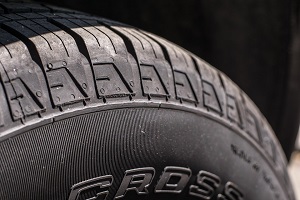

The outermost layer of your tire is called the tread. This is the patterned rubber layer you can see. The pattern of the tread will depend on the type of tire you purchase and what use it is intended for.
Belts (or Belt System)
Directly below the tread of your tire are the belts. Most commonly, belts are construc ...[more]
Tags:
tire facts
Posted in:
Tires 101
Why You Shouldn’t Drive on an Empty Gas Tank
March 14th, 2019
You’ve probably been told at some point in your driving career to not drive your car while the gas tank is on empty, but did you know why that is? This recommendation is more than just an old wives’ tale—you can damage your car by ignoring that gas light for too long.

First, you should understand what your fuel light indicator really means. When you hear the familiar “ding” that accompanies your fuel light, your fuel tank has reached “reserve” levels, or around 10-15% capacity. It is possible to calculate how long that will last using your car’s average range, but we would advise against it, just to be safe. Avoid doing the math if you know you are the type of person to risk it and drive on empty anyway.
One reason it ...[more]
Tags:
auto repair
Posted in:
Auto Repair 101
| << Previous | 123 | Next >> |
Categories
Archives
2022
October (1) September (1) August (1) July (1) June (1) May (1) April (1) March (1) February (1) January (1)
2021
December (1) November (1) October (1) September (1) August (1) July (1) June (1) May (1) April (1) March (1) February (1) January (1)
2020
December (2) November (2) October (2) September (2) August (2) July (2) June (2) May (2) April (2) March (2) February (2) January (2)
2019
December (2) November (2) October (2) September (2) August (2) July (2) June (2) May (2) April (2) March (2) February (2) January (2)
2018
December (2) November (2) October (2) September (2) August (2) July (2) June (2) May (2) April (2) March (2) February (2) January (2)
2017
December (2) November (2) October (2) September (2) August (2) July (2) June (2) May (2) April (2) March (2) February (2) January (2)
2016
December (2) November (2) October (2) September (2) August (2) July (2) June (2) May (2) April (2) March (2) February (2) January (2)
2015
December (2) November (2) October (2) September (2) August (2) July (2) June (2) May (2) March (3) February (1)
2014
November (2) October (2) September (2) August (2) July (1) June (2) May (2) April (2) March (2) February (2) January (2)
2013
Tags
tires MPG gas mileage New Warehouses preventative maintenance winter auto repair winter car service tire summer tires all season tires winter tires drivers safety auto repair auto service brakes brake service flat tires car repair oil change brake fluid transmission fluid power steering fluid tire pressure Fuel Economy air conditioning car alignment Mother's Day AC Service wheel alignment tire rotation tire repair tread depth tread wear replacing tires driving safety back to school tire rotation service tire inflation Halloween vehicle lighting headlights holiday travel oil changes car air conditioning mechanic car battery snow tires high mileage car high mileage engine tire recycling tire technology tips auto facts tire facts check engine light spark plug truck tires used car buying tips performance upgrades Serpentine Belt Timing Belt Spare Tire Tire safety Parking Brake Engine Facts Auto Maintenance Tire Maintenance Traffic Laws Buy New Tires Tire Types headlight restoration Tire Recycle Auto Repair



